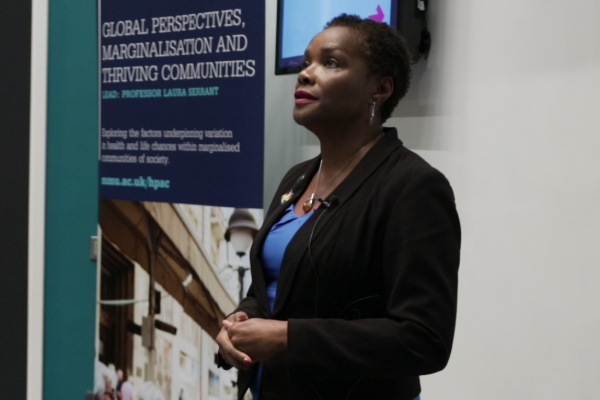RCN Research Strategy
Maximising impact and outcomes through research
Foreword
Research is crucial to everything that we do as nursing staff. Being able to deliver evidence-based practice ensures that what we do is safe and effective.
Research in health and social care answers questions and generates solutions to address challenges faced by both individuals and populations. It can also support the health and wellbeing of nursing staff themselves.
The RCN research strategy was authored by Dr Ada Hui, RCN Head of Research and Professor Jane Ball, Director of the RCN Institute for Nursing Excellence. For any enquiries about the strategy, please email us at research.enquiries@rcn.org.uk.

Introduction
The nursing community requires a unified approach to embedding research at the heart of practice. The RCN Research Strategy aims to provide a framework to empower nurses to lead, engage with, and apply research that transforms person-centred care, improves outcomes, and addresses complex health challenges.
This strategy promotes the view that nursing research is a necessity. It is the engine that drives innovation, strengthens our voice in policy decisions, and ensures care is grounded in robust, evolving evidence. It also acknowledges the diverse contributions nurses make to research, from clinical inquiry and patient-led research to academic leadership and interdisciplinary collaboration.

Research in health, social care and public health is crucial to inform high quality, evidence-based practice (Baker et al., 2021; NMC, 2018; O’Bryne and Smith, 2010; WHO, 2020) and a well-educated, well-informed and research active health and social care workforce is known to contribute to better health and social care outcomes (Baker et al., 2021; Hui et al., 2021; WHO, 2020; Boaz et al., 2024 ).
Therefore, research should be at the heart of the RCN and rooted in all spheres of nursing. Nurses’ roles in research can include:
- identifying best evidence to inform practice
- engaging patients and the public in research studies
- leading or supporting research delivery
- commissioning, designing, and leading high quality research studies to innovate and improve knowledge in health and social care.
This strategy recognises and promotes the value of research both in nursing and on nursing. Research in nursing considers how nurses engage with, design, deliver, lead and/or apply research. Research on nursing refers to research about the profession and professional practices and encompasses a wider sphere of health-related research. Our research strategy straddles both. The RCN wants to see research embedded at the heart of nursing, so that it influences and impacts on all aspects of nursing to improve patient, health and social outcomes. For a culture of research to become the norm in nursing, research needs to be a part of all education and career stages, all fields and contexts of nursing, locally and nationally (Wellcome/Nesta, 2025).
Background
Research and evidence are essential to achieve the objectives of the RCN’s Royal Charter:
- To promote the science and art of nursing and education and training in the profession of nursing.
- To promote the advance of nursing as a profession in all or any of its branches.
- To promote the professional standing and interests of members.
- To assist members who by reason of adversity, ill-health or otherwise are in need of assistance of any nature.
- To promote through the medium of international agencies and otherwise the foregoing purposes in other countries as well as in the United Kingdom.

We represent the four countries of the United Kingdom (UK) and have an important role in supporting nursing research and advocating for nursing involvement in research. There has been increasing emphases across the UK on building research into health and social care professional careers (NHS, 2021; Department of Health and Social Care, 2021; Department of Health, Social Services and Public Safety, 2016; 2023; Health and Care Research Wales, 2023; Health Education England, 2022; Lothian NHS Board, 2022; NHS Education for Scotland, 2023) but opportunities vary. The RCN can play a role in creating a UK wide perspective.
Research in nursing has expanded to encompass a wide range of contexts and career opportunities: in clinical practice, clinical education, clinical academic, academic and research delivery (Department of Health in Northern Ireland, 2023; Health Education England, 2022; Lothian NHS Board, 2022; Pattison et al., 2022; WHO, 2020). The numbers of advanced nurse practitioners (ANPs), clinical research nurses and nursing professors have also increased (WHO, 2020), shaping the profession and paving the way for aspiring future nurses, leaders, nurse researchers and research nurses. Although it is unclear how this varies across the UK.
Research in and on nursing has impacted effective changes to policy, practice, patient outcomes and society (Baltruks and Callaghan, 2018; Department of Health and Social Care, 2021; Department of Health, Social Services and Public Safety, 2016; Health and Care Research Wales, 2023; NHS, 2021; NHS National Services Scotland, 2022; NIHR, 2022; NMAHP-RU, 2017). Furthermore, the impact of nursing research is demonstrated in each of the Research Excellence Framework (REF) exercises in the UK (Kelly et al., 2016) and when good quality nursing research is submitted for evaluation, it demonstrates that significant impact is achieved (Kelly et al., 2016). However, the nursing contribution is often more hidden than that of other disciplines (Kent et al., 2024).
Despite advances within the profession, challenges persist, particularly relating to funding, visibility, and resources. Nurse involvement in clinical research delivery can be hampered by prevailing attitudes and systems that create resistance (Tinkler et al., 2025). Although nursing is the largest profession within the health and social care workforce, it remains underrepresented in some areas (O’Byrne and Smith, 2010; Segrott et al., 2006) including, geographical location (NHS, 2021), particular fields of nursing, for example, community and mental health nursing (James Lind Alliance, 2025), in research leadership (Farquharson, 2023) and in the authorship of publications (Hinkley et al., 2023; Kline, 2014; WRES, 2023; NHS, 2021; NIHR, 2022). Under-representation of nurses creates gaps in health and social care; it affects what research questions are being asked, how research is being conducted and how research knowledge is mobilised and implemented (Baker et al., 2021; Hui et al., 2021; NIHR, 2022).
Nursing knowledge and representation is required across all dimensions of research (including engagement, inclusion, delivery, leadership) and throughout the whole research process (including developing research questions, commissioning research, study design, participant recruitment, data analysis, reporting findings and application). Yet there are significant challenges in increasing research activity in nursing and equitably supporting nurses involvement in research throughout their careers. For example, although 23% of UK-based nurses are internationally educated (OECD 2023) disparities in access to research, education and workplace opportunities are experienced by internationally educated nurses, via processes of institutional injustice (Hui et al., 2021; WRES, 2023). Without fully engaging nurses and nursing in research, expertise is lost, and a lack of diversity persists in research leadership, design and delivery, having negative outcomes on patient care.
The strategy
The Royal College of Nursing (2023) A New Dawn for Nursing: Five-year strategic plan 2023-2027 reaffirmed the RCN goal to be the Voice of Nursing. It set out the vision for the development of the RCN Institute of Nursing Excellence (the “RCN Institute”) and, with this, the need for a contemporary research strategy.
The RCN Institute of Nursing Excellence was developed during 2024. It comprises five academies: activism, international nursing, nursing leadership, nursing practice and nursing workforce. It aims to become a leading national authority for the nursing profession with a commitment to underpinning the work of its five academies with evidence.
The research strategy will shape the strategic and operational direction of the RCN Institute and wider RCN (including research activity of the forums), whilst having wider influence and impact beyond the RCN.

The purpose of the research strategy is to promote ‘the Voice of Nursing’, (RCN, 2023); to develop and facilitate use of high-quality evidence to underpin professional practice; and to support research for and by nurses, through education, careers and leadership activity. This research strategy seeks to be ambitious in transforming the place of research in nursing. It seeks to:
- promote the role of research in nursing by promoting research awareness and leadership
- support the utilisation of outcomes of nursing research so they can have greater impact
- recognise and promote the contribution (and potential contribution) that nurses make to research – from shaping research funding calls through to delivering and leading pioneering studies
- advocate for the conditions needed to enable nurses (in practice and academia) to contribute effectively to research.
We occupy a unique space to influence, impact and leverage research with our membership, representatives, activists, RCN Fellows, forums and staff, and it has the voice of nursing at its core.
A co-productive approach has been central to the development of this research strategy with engagement supporting each iteration. The shared experiences and expertise of a range of RCN members, fellows, staff, forums and experts across the four nations have been invaluable to shaping the College’s vision.
Our mission
Our mission with this research strategy is to increase the influence, impact and outcomes of research for nursing, within and beyond the RCN; to enable research careers and leadership; and to create change so a culture of research becomes embedded in everyday nursing practice.
This will require partnership working with the National Health Service (NHS), independent health and social care (IHSC) organisations, national networks, funding bodies, higher education institutions (HEIs), as well as our RCN Fellows, forums and the wider membership.

Working with these groups, we aim to:
- support the transformation towards a research-led culture and embed research as core business to enable access, engagement, inclusion, delivery and leadership for nurses and nursing in research
- challenge current barriers, including inequalities and underrepresentation of people and professions, and lobby for inclusive systems that can enable high quality research leadership and rewarding careers for a diverse range of nurses
- contribute to the use and promotion of research to influence and improve nursing education, leading to innovations in policy and health and social outcomes.
The goals of the research strategy are aligned to the goals of the RCN five-year strategic plan:
- The RCN as the Voice of Nursing (Influence)
- The RCN has a sustainable and viable business model (Infrastructure)
- The RCN has an engaged, thriving and diverse membership (Impact).
Our goals: Influence
We are a unique organisation comprising professional body and trade union. With over half a million members and a large diverse mix of expertise amongst its staff, we can leverage our position as the ‘Voice of Nursing’ to drive cultural and systemic change, by seeking to influence research funders, universities, health and social care providers, employers and policy makers.
In the context of this strategy, successful influencing includes supporting a culture of curiosity and enabling access, engagement, inclusion, delivery and leadership of high-quality research for nurses and nursing.

Early engagement of research in nursing education is key to building confidence, transforming attitudes, cultures, practices and outcomes, to inspire research active careers and ‘release nurse’s research potential’ (Brand et al., 2021; Naylor et al., 2014; NHS, 2021). Equitability is needed in ensuring nurses who actively lead or deliver research are recognised for their expertise. This requires terms and conditions that enable growth in nursing capacity and capability to be involved in and lead research. For example, recognition of ANPs and consultant nurses’ higher level of practice requires them to be fulfilling all pillars of practice – including research.
To achieve this goal, the RCN will:
- raise the profile of the research contribution of the nursing profession.
- develop and strengthen collaborations with key stakeholders, including HEIs, research funders, independent sector organisations and charities in order to raise the profile of research within nursing and amplify research as core business of every nurse
- lobby for recognition and reward that value the contribution of nurses to research and facilitate growth in clinical academic, academic and research nursing workforce
- throughout the UK, seek to ensure terms and conditions are in place that can enable growth in nursing capacity and capability for involvement and leadership of research
- promote leadership, impact and outcomes of nursing research, and identify how nursing expertise might be better recognised
- explore opportunities in collaboration with HEIs to better support student placements and career pathways to include research
- use the expertise of our staff, RCN forums, RCN Fellows, and RCN members to champion inclusivity and work towards addressing challenges around access, engagement, inclusion, delivery and leadership of research
- promote research opportunities and celebrate research successes
- promote the use of nursing research evidence (within and beyond the RCN), including effective use of social media platforms and community of practice platforms.
Proactively utilising research findings to promote evidence-based solutions to the challenges facing nursing, increases our potential to influence, amplifying and sustaining its role as the ‘Voice of Nursing’ and as thought leader – in workplaces, policy and society more widely.
Our goals: Infrastructure
This research strategy requires an internal infrastructure to support it. The development of the research strategy has coincided with the establishment of the RCN Institute, offering an opportunity to combine endeavours.
A central tenet of the Institute is a commitment to ensuring that the work of every part of the College (every department, and each function) is well evidenced through programmes of work undertaken by its five academies, in conjunction with the cross-cutting strands of education and research.
Using evidence provides the foundation blocks for the Institute; the Institute can then provide a stable platform for the RCN and its work, to support all our members and the profession across health and social care.

The Institute will thus be pivotal to delivering the research strategy. We will do this by:
- developing webpages and an internet-based ‘Community of Practice’ to make resources (expertise, current projects and associated publications) and the structure of the RCN Institute visible and accessible
- establishing an internal ‘research activity database’ providing oversight of the different research leads and projects in the RCN. This will map existing research and areas of expertise, collate outputs and impact, whilst identifying gaps in knowledge that need addressing
- utilising research evidence in the materials generated for RCN members (particularly Institute outputs), to support the spread of evidence-based practice and nursing excellence
- sharing resources to support and enable research, that are readily accessible and clearly signposted (for example the modules on NIHR Learn). This will include educational resources (such as introductions to research, ethics, research designs, methods and processes, equality, diversity and inclusion, patient and public involvement, working with underrepresented people and professions, and sensitive topics); research templates (for example participant information sheets, consent forms); professional development resources and links to key funding bodies, including the RCN Foundation.
- collaborating across all four countries and with central departments (such as Policy, Communications, and Employment Relations) to coordinate research related activity.
- engaging with wide range of RCN members and stakeholders to ensure shared knowledge, quality and expertise.
The Institute also has a key role to play in addressing barriers to nurses engaging and leading research, so that nursing research can thrive.
Barriers to nursing research include: challenges securing competitive research funding alongside teams and professions with established track records in research, lack of career structures that enable entry into research careers or allow research to be a substantial part of clinical roles, the absence of systems of reward and recognition for contributions made by nursing clinical academics, competing priorities between research, teaching and/or clinical practice and lack of diversity and leadership role models in research and senior roles (Health Education England, 2022; Kline, 2014; O’Byrne and Smith, 2010; Segrott et al., 2006).
Lack of protected time to do research - even when that time is fully funded by an award and research is an agreed component of the role – is a significant barrier. The need for dedicated funding and protected time (Kim et al., 2022); high quality mentorship/multi-disciplinary teams and being situated in research-supportive environments have all been identified as being fundamental to research leadership and success for nurses (Farquharson, 2023). To build clinical research across the UK requires improved career opportunities and career paths, equitable pay and conditions across higher education and clinical providers, the creation of strong research cultures, and better data to monitor numbers and distribution (OSCHR/CODH, 2025).
To support our mission to shift nursing cultures and practices to being research-led, we will:
- review investment to research and work with funders to harness financial support for growing nursing research
- work with stakeholders to create better support and guidance for universities and health care providers to enable research to be more firmly embedded in nursing, such as through protected time, equitable terms and conditions of employment, and improved career paths.
- establish a mentorship programme, bringing together the expertise of our members, forums, RCN Fellows and wider networks to support nurses to be research active, to develop research careers and become research leaders across health, social care and public health
- co-develop and deliver regular webinars and workshops with our members, forums, fellows and events team to showcase the broad-ranging roles of nurses in research at different levels; including research pathways, career opportunities, specialisms, contexts and leadership; to inspire and promote research and visibility of role models
- design and develop research focused resources and signpost to existing external resources to enable and promote research skills and career development.
Our goals: Impact
Having a strong evidence base, good dissemination, and strong communities of practice will be crucial for mobilising knowledge and enabling nursing research to fulfil its potential to positively impact on the profession, patients and public and society more broadly.
Our work will continue to be of high quality and evidence based, ensuring that research knowledge and expertise pervades the College’s work.
Showcasing the wide-ranging research and leadership roles the profession offers will highlight the differing dimensions of what nurses can be involved in and what research can offer for the profession, health and social care outcomes, as well as for individual careers. The role of research in clinical careers is also paramount for the retention of highly skilled colleagues.

This research strategy sets out ambitions to support and enable research for underrepresented individuals, fields, professions and communities, ensuring that diversity and inclusion is prioritised in decolonising research and establishing equal opportunities. We are unique in having regional offices, national reach across the four nations and international links and networks. This provides opportunities to work collaboratively to ensure research findings are shared and utilised to maximise the impact on nursing practice and policy.
To achieve this goal, we will:
- ensure that the work of the RCN Institute and the five academies supports the research taking place in each of these areas, provides equal opportunities to meet the needs of under-represented people, communities and professions, and ensures that research is accessible, engaging and inclusive
- work closely across the UK, in collaboration with universities and employers, to challenge barriers and promote enablers for nursing research and nurses’ involvement and leadership of research
- build and sustain international collaborations to develop programmes that help address global challenges and enable shared learning
- maximise RCN events, groups and activities as opportunities to stimulate and support nursing research by celebrating success, showcasing nurse-led research, highlighting best practice, enabling dialogue about challenges and solutions. This includes RCN congress, RCN Fellows, forums, members events and conferences (such as the International Nursing Research Conference and the Education Conference), Library, Archive and Events.
Conclusion
This strategy identifies key priorities to enhance the role of the RCN in relation to research, in line with our broader strategy.
The goals align to the strategic ambitions of the RCN, and to those of the new RCN Institute. They have been developed following extensive consultation and engagement with our members, our expert reference group, RCN Fellows, RCN staff and external stakeholders. We thank each of those individuals for their time, patience and expertise in shaping this strategy.
The research strategy will continue to be informed and influenced by our members and stakeholders as the work of RCN Institute of Nursing Excellence develops. The goals and outcomes of the strategy will be reviewed to ensure key activity and metrics are aligned to the operational plans of the Institute and other parts of the RCN. The strategy will be used to inform future plans, to help ensure the sustainability of research for the benefit of RCN members, nursing, health and social care, and society.

The RCN Research Strategy sets out our vision to champion nursing research, and to empower all of our members to lead, engage with, and apply research findings, that not only benefits patient care and outcomes, but also helps to raise the profile of nursing research for generations to come.
Some of our publications are also available in hard copy, but this may entail a small charge. For more information and to order a hard copy please call 0345 772 6100 and select option five. The line is open Monday-Friday (excluding bank holidays) between 10am-4pm.
You can download all electronic publications from the RCN free of charge.
Published by the Royal College of Nursing, 20 Cavendish Square, London, W1G 0RN.
© 2016 Royal College of Nursing. This publication in hard copy format may not be lent, resold, hired out or otherwise disposed of by way of trade in any form of binding or cover other than that in which it is published, without the prior consent of the publishers.
For permission to reproduce RCN copyrighted text, please complete our copyright request form.
Page last updated - 05/02/2026

 Share on LinkedIn
Share on LinkedIn




